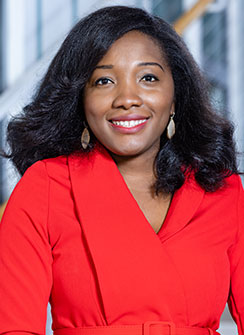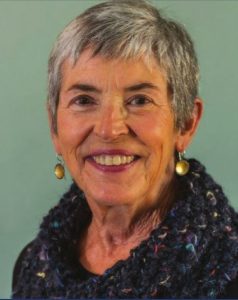Her first week in college, Yvonne Commodore-Mensah, Nurs ’14 (PhD), SPH ’19 (MHS), saw a poster encouraging students to consider a career in nursing. She immediately changed her major.

“I have to be honest,” she says. “Sometimes I pinch myself and I say, ‘I can’t believe I get to do what I’m doing now as a nurse, and I get to do it at Johns Hopkins.’”
Now an associate professor at the Johns Hopkins School of Nursing (SON) with a joint appointment in the Department of Epidemiology at the School of Public Health and a faculty member at the Center for Health Equity, Commodore-Mensah works to advance equity in cardiovascular health in Maryland and around the world.
She’s also a Discovery and Innovation Fund grant recipient, made possible through gifts from Natalie and Wes Bush and Karen Combs, and a bequest from Gertrude Bengston. The fund provides grants to support groundbreaking work of SON pre- and post-doctoral students, as well as faculty.
Combs, Nurs ’70, practiced community nursing before spending a few years on faculty at the University of Wisconsin School of Nursing. There, she says, she saw firsthand the difficulties of funding research.
“One of my interests in the Discovery and Innovation Fund is that it enables faculty to get their feet on the ground monetarily, to enable them to do research to further their career, and contribute to nursing knowledge and hopefully some innovative breakthroughs,” Combs explains. “I think Dr. Commodore-Mensah’s area of interest in cardiovascular disease is key because it’s a very large health indicator, and there’s so much that can be done around prevention to enable people to lead healthy lives.”
Commodore-Mensah learned of the disparities in cardiovascular health early in her career and found the numbers distressing — Black people are more likely to have hypertension and diabetes, and they’re also more likely to die from those conditions. She began to question the real impact of race and if skin color is a proxy for poor cardiovascular outcomes.
“I’m a nurse first, but I’m also a cardiovascular disease epidemiologist,” says Commodore-Mensah, who is also one of SON’s inaugural Term Professorship for Rising Faculty recipients. “Because I’m originally from Ghana, I wondered, ‘Well, even though I’m Black, I wasn’t born here. Does it also mean that I’m prone to develop these conditions because of my skin color?’ That’s when I discovered that there’s very little data on African immigrants.”
She learned that data on Black people have been aggregated, which masks differences between groups and contributes to gaps in knowledge on African immigrants.
For her dissertation research, Commodore-Mensah worked with a team of Hopkins students from the schools of Nursing, Public Health, and Medicine to conduct a cross-sectional study to better understand the burden of cardiovascular disease risk factors — like hypertension, obesity, diabetes, and smoking — among African immigrants. The findings confirmed her suspicions.

When people arrive in the U.S., she explains, changes occur in behavior and diet. The prevalence of obesity among study participants was very high — up to 93% were considered overweight or obese. The rate of hypertension was also elevated, with about 42% of the participants having high blood pressure.
Commodore-Mensah remembers participants asking what the team would do with the information they collected. She assured them the data would be used to apply for grants to implement community-based programs to improve the cardiovascular health of African immigrants. Thanks to the Discovery and Innovation fund grant, the team has done just that.
They’ve hired a certified diabetes education specialist, who is African, to deliver an intervention over a 12-month period to people who attend two African churches in the Maryland area. The specialist teaches participants how to prevent diabetes and improve heart health by being more active and making changes to their diet in ways that are consistent with their cultural values.
The program also provides participants with a free blood pressure monitor, and they can download a mobile app that allows them to import data to allow Commodore-Mensah and her team to monitor their readings. If their blood pressure is too high, a team member reaches out.
“We’re not just collecting data to understand the burden of these conditions, but to actually intervene,” Commodore-Mensah says.
She adds participants have expressed a deep sense of gratitude for a program tailored to their needs and culture and located in a space they trust. One participant, for example, was unaware she was in the pre-diabetes range until she had her blood sugar checked at church as part of the program. The team went back after six months and checked again, and the participant’s blood sugar was normal.
“Even though it’s a small pilot study, only 60 participants, for each person whose health improves and who’s at lower risk for diabetes or cardiovascular disease, we feel like it’s very well worth it,” Commodore-Mensah says. “The ultimate goal is to prevent premature death and allow people to live longer, healthier lives.”
The study is still ongoing, but Commodore-Mensah hopes to use the data to provide evidentiary support for replicating the program in other areas of the country with large African immigrant populations.
“It’s wonderful that the Discovery and Innovation Fund is supporting nurse scientists. I think that nurses are uniquely positioned to answer a lot of these questions that plague us in terms of health disparities,” she says. “We consider all their personal circumstances, their social determinants of health, where they live, and the impact that it has on their health.”
Topics: School of Nursing, Fuel Discovery, Promote and Protect Health